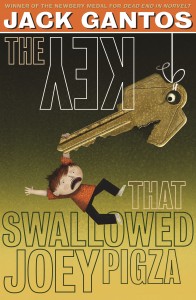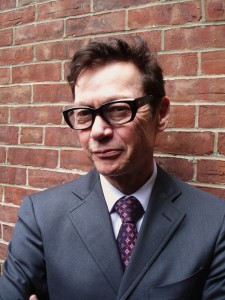JACK GANTOS is the author of over forty-five books for children from the ROTTEN RALPH picture books, collections of JACK HENRY short stories, upper elementary and middle school JOEY PIGZA novels, young adult novels—LOVE CURSE OF THE RUMBAUGHS, DESIRE LINES, and a memoir, HOLE IN MY LIFE. His work can lead readers from the cradle to the grave. 
Mr. Gantos was a professor at Emerson College where he developed the Masters Degree Program in Children’s Literature, Writing and Publishing. He now spends his time writing and is an active speaker at book and literacy conferences, schools and libraries. His works have received a Newbery Award, Scott O’Dell Award, Newbery Honor, Printz Honor, Sibert Honor, National Book Award Finalist honor, and he is the 2010 recipient of the NCTE/ALAN AWARD for his contribution to the field of Young Adult and Children’s Literature. DEAD END IN NORVELT received both the 2012 John Newbery Award and the Scott O’Dell award for Historic Fiction. This was followed by the companion novel, FROM NORVELT TO NOWHERE. His most recent release is THE KEY THAT SWALLOWED JOEY PIGZA which was just nominated for the Kirkus Prize.
I interviewed Jack about his writing, and his latest book, The Key that Swallowed Joey Pigza. This is the continuation of the interview from the previous week.
In The Key That Swallowed Joey Pigza, your character Joey says to his father: “Nobody hates you. We’re just afraid of you, which is confusing because we love you.”
This helps the reader to understand the dysfunctional family dynamic at work. How did you come up with that line?
It seems so logical to me. It has hate, fear and love all rolled into one sentence. As a kid, I would choose to give and receive love over fear and hate.
A teacher mentioned to Joey that you get to know a kid by the types of games he creates. I think that’s very accurate and of course Joey’s is swallowing the key and is ambushing and killing roaches. What did you want the reader to take away from this?
That in the beginning of the book Joey had reverted, a bit, to his out of control self in the very first book—JOEY PIGZA SWALLOWED THE KEY. But then we quickly move on from this as JOEY has to take control of nurturing Carter Junior, and behaving like a protective, thoughtful, consistent older brother. …sitting in a room writing line after line is a solitary activity and you must listen to yourself.
The text alludes to Joey’s special gift he can feel what everyone else feels, which can be a blessing and a curse. I think this is an excellent point and you capture it well with your character. Do you feel in today’s society that this is something that isn’t valued and is meant to be “corrected,” like there is something that is wrong and broken in a person who is so sensitive?
No. Empathy is a quality that I find in a lot of people. Joey feels what others feel. I do too. And I expect others feel what I feel. We are all radiating a lot of emotional information and I think most people do a very good job of interpreting the radiant feelings of their friends and family.
You have your character Joey say (on p. 7): “It’s bad to fear your parents, but worse is when you fear yourself.”
This is mind blowing in a children’s book. Those powerful words coming from the thoughts of your character, is real, raw and emotional. It drew me into the text. I hear the struggle of your character with that simple line, and the enormous fear, and the burden of carrying that fear. It’s heavy.
How do you manage between the heavy emotional weight and the lightness of the story? It seems like a tightrope walking act.
Well, Joey has a lot of self-reflective moments in this final volume. This is the volume where finally he can see himself clearly, and the damage that others have heaped upon him. He has to make some decisions. Which is worse? Fearing your parents? Or fearing yourself? Joey would prefer to love himself and love his parents, but they force him to choose—so he has to choose to love himself.
When you write, how much thought do you put into how the reader will read what you have written? Do you place yourself in the reader’s seat?
Of course. I put everything into it—very deliberately. But then again, I prefer my readers to sit with Joey. Writing the best book you can is still the smartest path to take.
How much do you listen to your fans? Does it shape your work? If so, how much does it shape it?
I listen to my fans. But I write my own books. I love my fans. But sitting in a room writing line after line is a solitary activity and you must listen to yourself.
As a writer, I know there are parts that get edited. Are those edited parts just as interesting as the published copy?
Only some. Some are wisely cut.
How do you envision your future work? Is there a writing direction you want your work to go into that your work hasn’t entered?
I’m thinking about it now. Slowly. I’ve finished all the ROTTEN RALPH books, all the JACK HENRY books, all the NORVELT books, all the JOEY PIGZA books. So it is a time for me to choose carefully with what I want to write. I have ideas. I’m not tapped out at all. I just have to make the right choices, and I think I have the right choices lined up. It will take some years to get to them, but I will.
How did you find your editor and your agent, or did they find you?
My editor found me. Another editor had my work but the publisher wouldn’t go for it so he gave it to Wes Adams at Farrar Straus Giroux and Wes liked it and we’ve worked together for over 20 years, and 20 books.
What have you learned from the business side of the book writing business?
Writing the best book you can is still the smartest path to take.
A letter from Jack Gantos:
Dear Readers and Writers,
I am no different than any other writer in that the desire to write came to me after my desire to read. It is the reading that saturates the imagination with vast possibilities. Not just the possibility of creating a story, but with the possibility of holding a book in your hand that has your name printed on the cover.
In school I was a library helper. I shelved books and you can probably guess that the G section was my favorite. I would walk my fingers across the spines of the G authors until I came to my slot with GALDONE on one side and GEORGE on the other. I could imagine my book, with my last name fitting on the shelf between those two authors. Every school day I would pass that G shelf and imagine my book, with my name on it, proudly reaching out at me.
Of course, when you are young, it is easy to imagine a book with your name on it, but as I grew older I realized a bit of effort was going to go into the construction of a book. So I bought a small black writing journal and on the spine I took a pen knife and carved my last name into the black cover. I wasn’t sure what to title the book and so I didn’t. After a while I just called it my “Black Book.” I took that book everywhere. I wrote very unorganized stories in it. But I did have an eye for the odd moment. I saw my dog eaten by an alligator. I wrote about it in my Black Book. I saw an airplane crash in my neighborhood. I wrote it down. I broke my brothers arm—three times! I wrote it down. And I kept filling up the Black Book. And when it was full of odds and ends and bits and pieces of stories I made a fake library call number and pasted it on the spine of my book. I glued a card pocket on the inside back cover and slipped a Date Due card inside. Then I carved my title on the spine: JACKS BLACK BOOK. When no one was looking I went to the book shelf and slipped it between GALDONE and GEORGE.
Each day I would pass it in the library. Weeks went by. It didn’t move. Then one day it was gone! I was thrilled.
But after many long weeks went by I thought maybe it was pretty foolish of me to put the only copy of my book on the shelf. Whoever checked it out was probably laughing at me. I was feeling pretty dejected. The empty gap on the shelf where my book had been now looked like a sad missing tooth.
Then it came back. I was working in the library and found it in the BOOK RETURN bin. I quickly flipped to the back where I had written a note on the last page asking the reader if he or she liked the book. They had responded. Eagerly I read: “Whoever wrote this book should seek mental help.”
I did. But it wasn’t a doctor. I went to my teacher and told her what I had done and asked for help on how to organize my stories. She did help me. She, and reading more books, made me a better writer. 
I went to college for creative writing. I have published forty-five books from the ROTTEN RALPH series to the JACK HENRY series to the JOEY PIGZA series to HOLE IN MY LIFE and more—all the way to DEAD END IN NORVELT, the 2012 Newbery Medal winner. I have won many awards, but the Newbery Medal tops them all. FROM NORVELT TO NOWHERE has just been released. Will it top the Newbery winner? Some people think it has.
But the fifth and final “JOEY PIGZA” book, THE KEY THAT SWALLOWED JOEY PIGZA, has just been released. Joey is winning awards and spinning heads everywhere. When your head stops spinning let me know what you think.
All Best,
Jack Gantos
